Melody Cruise 1933)
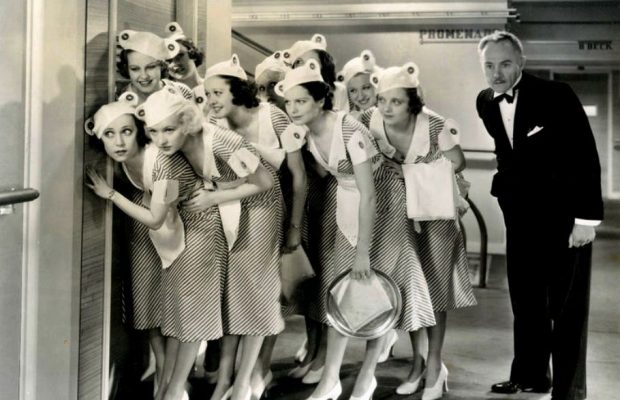
Toronto Film Society presented Melody Cruise (1933) on Sunday, April 14, 2019 in a double bill with Interrupted Melody as part of the Season 71 Sunday Afternoon Film Buffs Series, Programme 7.
Production Company: RKO Radio Pictures. Director: Mark Sandrich. Producers: Merian C. Cooper, Louis Brock. Screenplay: Ben Holmes, Mark Sandrich, with additional dialogue by Allen Rivkin, P.J. Wolfson. Music: Max Steiner. Cinematography: Bert Glennon. Film Editing: Jack Kitchin. Special Effects: Vernon L. Walker, Linwood G. Dunn. Sets: Van Nest Polglase, Carroll Clark. Release Date: June 23, 1933.
Cast: Charlie Ruggles (Pete Wells), Phil Harris (Alan Chandler), Helen Mack (Laurie Marlowe), Greta Nissen (Elsa Von Rader), Chick Chandler (Hickey), June Brewster (Zoe), Shirley Chambers (Vera), Florence Roberts (Miss Potts), Marjorie Gateson (Mrs. Grace Wells), Betty Grable (First Stewardess).
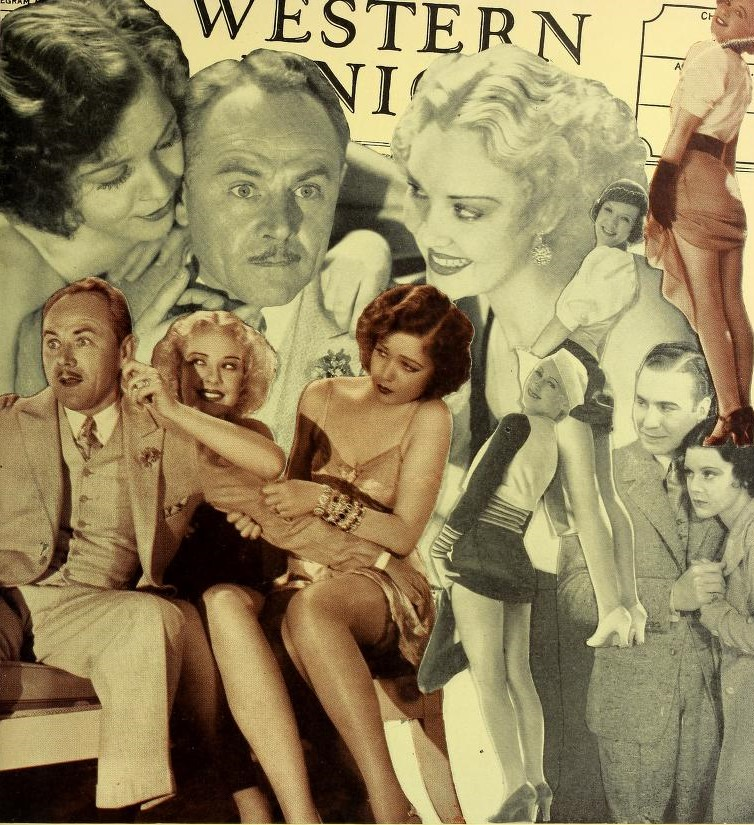
Three years ago, Cinevent played this little pre-Code and it appeared to be a minor hit. I even wrote that it was possibly my favourite film of the festival! And this is interesting because generally, musicals are not more forte, so to speak, since I’m more of a drama queen. It stars Phil Harris, who I decided I had to pretend was attractive and on top of that, could also sing. I found it entertaining, albeit knowing it’s a movie, that every single woman on this cruise ship went gaga over him. During the Cinevent weekend later on, while watching an Alice Faye film, I suddenly recalled that she was the wife of Jack Benny’s bandleader, and Jack Benny’s band leader was, as Jim Lane described him in the Cinevent notes, a younger, sleeker and smoother Phil Harris, rather than the big loveable galoot we all remember from the radio programs and movies. I know “handsomeness” isn’t all it’s cracked up to be since Faye was first married to the good-looking Tony Martin before they each found longevity in marriages to others, her to Harris and him to Cyd Charisse.
I think for most of us vintage film lovers, Charlie Ruggles is always a delight. Here, you’ll find, he’s no exception.
Melody Cruise is a somewhat crazy, light and disconcerting story. The most fun elements of the film are both technical and sub-story-wise. The technical are the creative dissolves from scene to scene. They don’t just fade; they are patterned in truly artistic ways. The sub-story element involves two of the party revelers who should have left the ship before it set sail but are discovered just as they awaken out of their drunken stupors after having passed out under some discarded coats. How they are explained to the crew and others who are travelling with the Phil Harris and Charlie Ruggles’s party is very amusing with a bit of a quick-witted scramble of an idea, ending with one of the funniest scenes with the revelers parading around deck in less than formal attire.
Since first noticing Chick Chandler in the 1933 film Blood Money, I wondered why I hadn’t noticed this handsome man before. Here he plays Hickey, the “I can be of utmost service to you—for cash” ship steward. As a result of his performance in this film, RKO decided to give him a buildup in other feature films by signing him to a term contract.
The ending of the film is a visual joke, which would be one of the highly entertaining special effects created by Vern Walker and Lyn Dunn.
Interesting to note, the April 11, 1933 Hollywood Reporter reported that on the day the film wrapped, RKO Radio was forced to change the title of this Lou Brock feature musical from Maiden Cruise to Melody Cruise due to an approaching lawsuit by the author of a novel titled “Maiden Voyage”.
And to finish off, here are some somewhat entertaining contemporary New York theatre reviews of the film:
THE AMERICAN: A very gem of a picture, packed with gay insouciance, a sparkling, heady champagne to lift you out of the doldrums, the heat, or whatever troubles beset and fret you.
THE MIRROR: Decorated with pretty girls, punctuated with melodic interludes, its strong points are a very pretty ice-skating ballet and the work of Charles Ruggles.
THE POST: Has some sprightly tunes and several entertaining scenes, but that is not quite enough. It is well directed, too, we must add; and the camera tricks are original, but aside from Ruggles, Marjorie Gateson and Florence Roberts, there is no one in it who can act.
THE NEWS: A musical film with plenty of rhyme but very little reason.
THE TIMES: An adroit mixture of nonsense and music which makes for an excellent Summer show. It is, however, not the singing or the clowning that makes this a smart piece of work, but the imaginative direction of Mark Sandrich, who is alert in seizing any opportunity for cinematic stunts. From the viewpoint of direction this production is quite an achievement.
So, with this build up, we hope you enjoy Melody Cruise.
Introduction by Caren Feldman
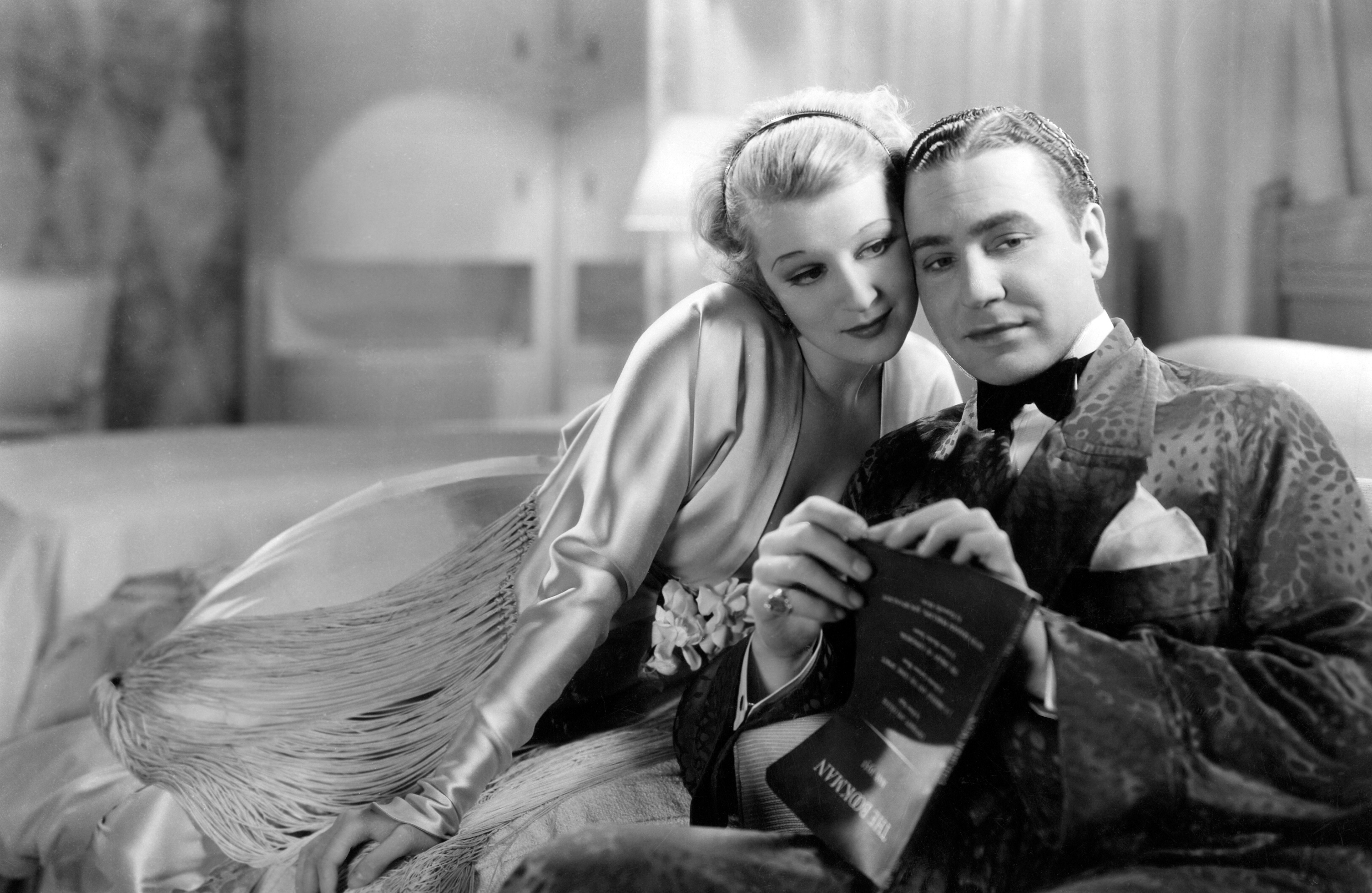
Melody Cruise, an RKO musical, stars Charlie Ruggles, a popular and hard-working comic actor who amassed seven credits in 1933 alone. He had recently appeared in great pictures like The Smiling Lieutenant (1931), Love Me Tonight (1932), and Trouble in Paradise (1932). The film was the first talkie feature to be directed by Mark Sandrich, who was soon to make a name for himself directing most of the Astaire/Rogers musicals for the same studio. Sandrich is one of the more underrated directors of the era—in large part because Fred Astaire’s genius would overpower Sandrich’s own talents in the public and critical reception of those films—but Melody Cruise shows a case to be made for Sandrich. ln addition to containing some delightful pre-Code naughtiness, Melody Cruise displays inventive editing techniques and optical effects, and an imaginative combination of sound effects and music. The New York Times took notice of this, declaring the picture to be “an adroit mixture of nonsense and music which makes for an excellent summer show…. It is, however, not the singing or the clowning that makes this a smart piece of work, but the imaginative direction of Mark Sandrich, who is alert in seizing any opportunity for cinematic stunts…. Some extraordinarily clever photography.” Making his feature film début here was future bandleader and radio personality (and future husband of Alice Faye) Phil Harris. The same year, the actor was directed by Sandrich in the hilarious, very pre-Code, Oscar-winning short So This Is Harris! (1933).
Sandrich had actually cut his teeth directing more than fifty one- and two-reel shorts for RKO in the preceding decade, and from 1930-1933, he also amassed many screenwriting credits. Melody Cruise was the last of these (he shared screenplay credit with Ben Holmes), probably because it was a big commercial hit and firmly established Sandrich as a bona fide feature director. Just one year later, he found himself directing Fred Astaire and Ginger Rogers in The Gay Divorcee (1934), followed by Top Hat (1935), Follow the Fleet (1936), and several others in the series. Sandrich directed Phil Harris twice more, in later years, in Man About Town (1939) and Buck Benny Rides Again (1940), both starring Jack Benny and the latter a hugely popular success in which Harris played himself. Sandrich produced Buck Benny Rides Again, and from there on produced as well as directed all of his remaining pictures. Sadly, there were only six more to go until he died of heart disease in 1945, but they included good ones like Holiday Inn (1945) and So Proudly We Hail! (1943). It’s enough to make one wonder what future great films never saw the light of day because of Sandrich’s early death.
Notes by Peter Poles


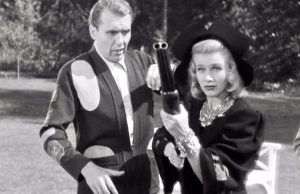
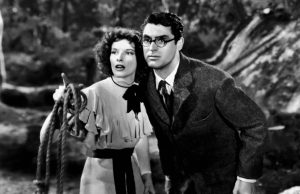






Leave a Reply